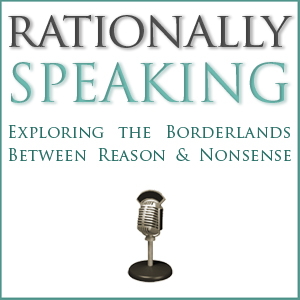Rationally Speaking #166 - Eric Schwitzgebel on "Why you should expect the truth to be crazy"
Rationally Speaking Podcast
New York City Skeptics
4.6 • 787 Ratings
🗓️ 21 August 2016
⏱️ 54 minutes
🧾️ Download transcript
Summary
Transcript
Click on a timestamp to play from that location
| 0:00.0 | Rationally speaking is a presentation of New York City skeptics dedicated to promoting critical thinking, skeptical inquiry, and science education. |
| 0:22.6 | For more information, please visit us at NYC Skeptics.org. |
| 0:35.3 | Welcome to Rationally Speaking, the podcast where we explore the borderlands between reason and nonsense. |
| 0:41.2 | I'm your host, Julia Galeff, and with me is our guest today, Professor Eric Schwitzgable. |
| 0:46.6 | Eric is a professor of philosophy at UC Riverside, where he focuses on a bunch of different |
| 0:51.7 | interesting topics, from philosophy of mind to moral psychology, |
| 0:55.7 | epistemology, and science fiction. And he also blogs at the Splintered Mind, which is one of |
| 1:00.7 | my favorite philosophy blogs. Eric was actually a guest on Rationally Speaking about a year ago, |
| 1:05.6 | talking about the moral behavior of moral philosophers, or lack thereof. And he's returning now to discuss another |
| 1:13.1 | topic entirely called Crazyism. Eric, welcome back. Thanks for having me. So what is |
| 1:19.1 | crazyism? Well, let's define a position as bizarre, just in case it's highly contrary to common sense, and a position |
| 1:32.4 | as crazy, in my technical sense of the term, just in case it's highly contrary to common sense, |
| 1:39.0 | and you're not epistemically compelled to believe it. Not epistemically compelled to believe it. |
| 1:45.0 | Does that mean that there isn't a good, there isn't good evidence or argument supporting it? |
| 1:50.0 | There might be some good evidence, but not enough to compel belief or bring you all the way to rationally justify high level of confidence in the position. |
| 2:00.0 | Okay. So that's crazy. So that would be in the position. Okay. So that's crazy. |
| 2:01.6 | So that would be for a position, okay, so there can be, just to clarify the terms just a little bit more. |
| 2:07.6 | This is all just technical terms that I invented. |
| 2:10.6 | So a position is bizarre if it's contrary to common sense, but some bizarre positions were epistemically compelled to believe. So, for example, |
| 2:19.9 | the twin paradox in relativity theory seems like there's excellent scientific evidence that |
| 2:26.3 | if one twin is traveling at high velocity relative to another twin and then turns around and |
| 2:33.8 | comes back, |
... |
Please login to see the full transcript.
Disclaimer: The podcast and artwork embedded on this page are from New York City Skeptics, and are the property of its owner and not affiliated with or endorsed by Tapesearch.
Generated transcripts are the property of New York City Skeptics and are distributed freely under the Fair Use doctrine. Transcripts generated by Tapesearch are not guaranteed to be accurate.
Copyright © Tapesearch 2025.

